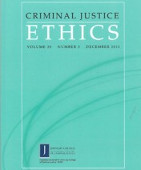9/10/2013
Journal Explores Incentive For False Results In Lab Tests For DUIAcademic article argues criminal justice system relies on forensic analysis influenced by incentives to yield guilty results.

A recent analysis published in the Criminal Justice Ethics academic journal suggests when technicians perform forensic analysis of blood and other evidence for cases such as drunk driving, the results can be influenced by built-in financial incentives to produce a conviction. Syracuse University Professor Roger Koppl joined Meghan Sacks from Fairleigh Dickinson University argue that even if false conviction rates are very low, a 3 percent error rate could put 33,000 innocent individuals behind bars every year.
The primary problem, according to the paper, is that fourteen states reward crime labs with a bonus for each conviction they generate. North Carolina pays a $600 bounty "upon conviction" to the law enforcement agency whose lab "tested for the presence of alcohol." These incentives do not necessarily encourage scientists to lie, rather they tend to create an observation bias when measuring, for example, a blood specimen for its blood alcohol content.
"We tend to see what we expect to see and what we hope to see," Koppl and Sacks wrote. "Incentives ('motivation' and 'hope') can skew honest errors because they influence perception."
When there is a reward for a guilty result, a lab technician will not double-check test results that are in the guilty range, though he would be more likely to double-check results that show innocence. The same effects do not work in favor of the defense, which usually depends solely on the forensic report produced by the prosecution.
"The subjectivity of forensic science matters in part because of the twofold monopoly in forensic science," Koppl and Sacks wrote. "First, evidence is typically examined by one crime lab only. In this sense, the crime lab receiving a bit of evidence has a monopoly on examination of that evidence."
Radley Balko, author of the new book Rise of the Warrior Cop, cites the paper as an example of the need for reform.
"They're literally being paid to provide the analysis to win convictions," Balko wrote. "Their findings are then presented to juries as the careful, meticulous work of an objective scientist. No wonder there have been so many scandals."
In 2009, a crime lab in Colorado Springs, Colorado was caught certifying at least 82 DUI blood tests with falsely high readings. A whistleblower in Washington, DC revealed in 2010 that the city had been using faulty breathalyzer machines for more than a decade.
Koppl and Sacks called for more research into possible structural changes that could restore the balance. Some examples include privatizing crime labs and providing a voucher so that poor defendants could hire a private lawyer instead of depending on a public prosecutor.


